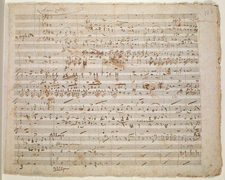A Donizetti Discovery
Nicolas Bell
Thursday, October 9, 2014

The following entry is by Nicolas Bell and originally appeared on the British Library Music Blog. It is reprinted here with kind permission.
The British Library’s Stefan Zweig Collection of musical, literary and historical autograph manuscripts includes many well-known treasures, but there are other pieces which have proved more difficult to identify. When Stefan Zweig bought a manuscript of Gaetano Donizetti from a dealer in Milan in 1938, he thought that he had acquired a piece for string quartet. He did not pursue the matter further, and the manuscript remained unknown until it was presented, with the rest of his collection, to the British Library in 1986 by his heirs.
In an article just published in the Electronic British Library Journal, Christopher Scobie has identified the music in this manuscript for the first time. A look at the clefs at the opening of the piece makes it clear that contrary to Zweig’s initial assumption, the piece is not for string quartet but for piano duet.
At first the music appears to be a conflation of two pieces: the opening ‘Larghetto’ section is known from Anna Bolena, the opera that made Donizetti’s name on its premiere in December 1830, while the following ‘Allegro’ is part of the overture to his much less successful opera Il diluvio universale, which was first performed earlier in the same year. In fact, as the article shows, both sections were originally used for Il diluvio universale, but after Donizetti had recycled the ‘Larghetto’ in Anna Bolena, he composed a new opening for the first overture, which was used in its revival in 1834 and ever since.
Some questions remain about exactly when and for what purpose this manuscript was written, and various proposals are made in Christopher Scobie’s article. The complete manuscript is available on our Digitised Manuscripts website, and see our earlier blog post for a list of other music-related articles in the British Library Journal.
Share Tweet EmailCatégorie: Redécourvertes

